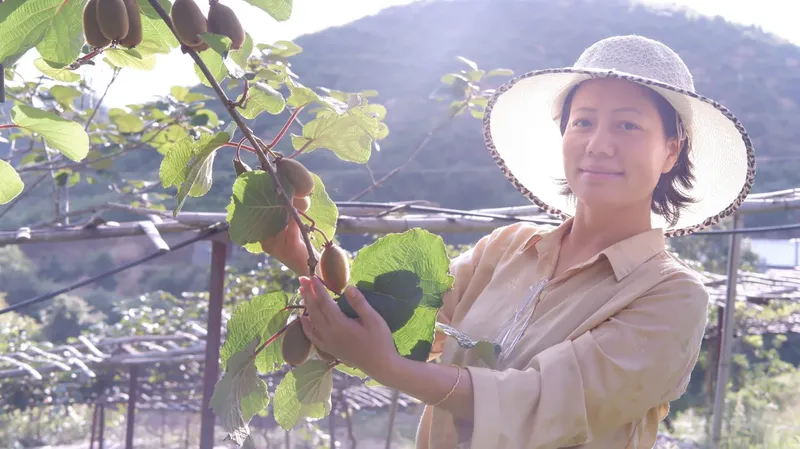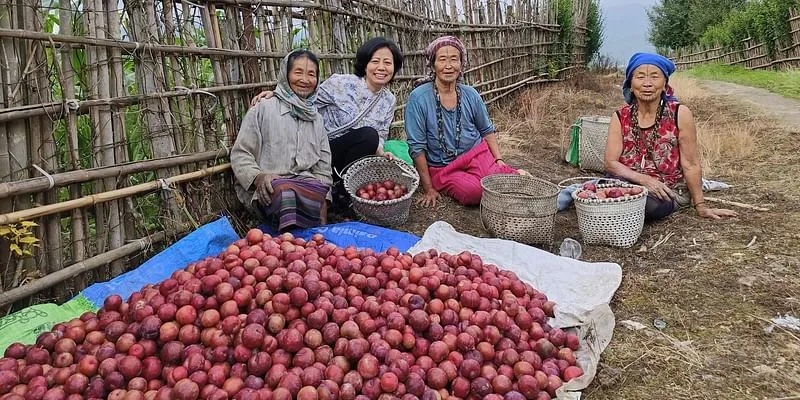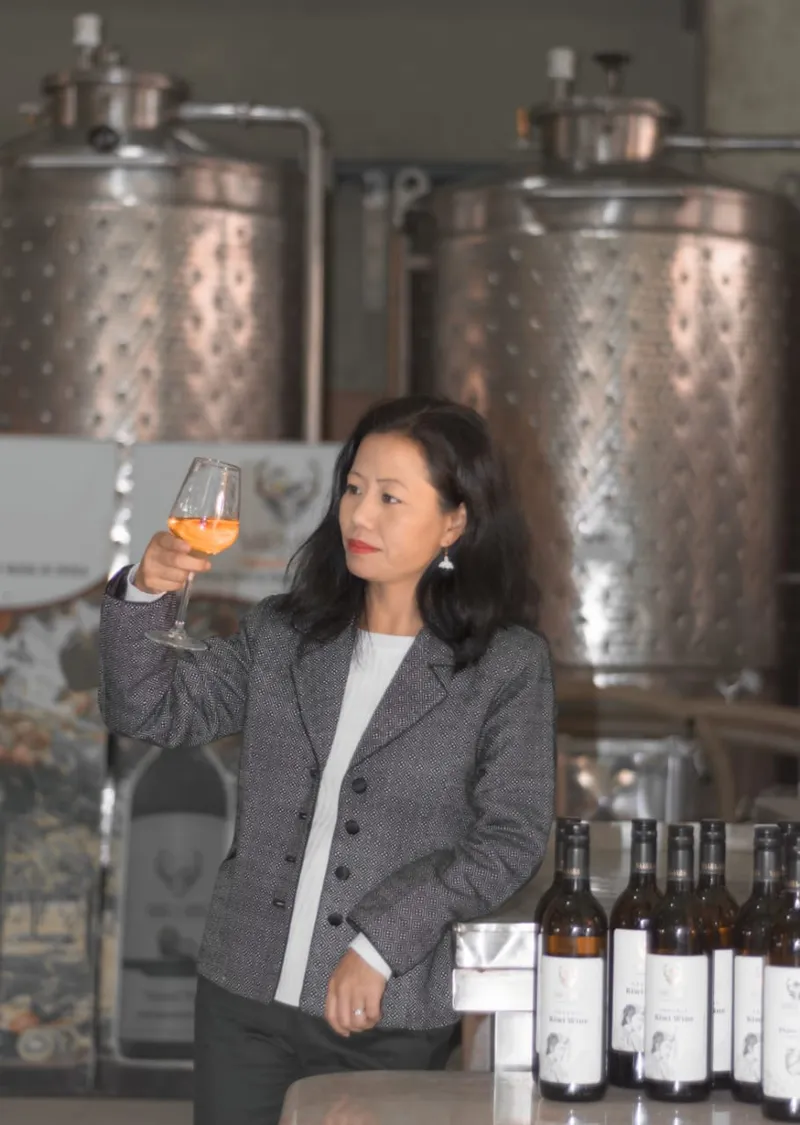Tage Rita is raising a toast to women’s entrepreneurship in the North East with kiwi wine
Tage Rita, a woman entrepreneur from Arunachal Pradesh, makes wine from fruits like kiwi, peach, pear, and plums. Her company also provides employment to hundreds of locals in the Ziro Valley.
The idea of starting a winery came to Tage Rita while enjoying a glass of wine with her partner. Although grapes would have been the obvious choice, she was also curious to find out if the different fruits grown in Ziro Valley in Arunachal Pradesh, where she comes from, could be used for making wine.
Kiwi seemed to be the right choice—the climatic conditions in the Ziro Valley were right for the fruit’s cultivation. She also discovered a large number of kiwi fruits were discarded because of the lack of a robust supply chain.

Tage Rita
In 2016, she launched , a range of wines made from kiwi fruit. It was named after her father-in-law who was affectionately known as Naara Aaba; Naara, the name of a place and Aaba denoting father.
Growing up in the Arunachal Pradesh countryside, Rita remembers a home surrounded by fruit trees, fish ponds, large vegetable gardens, the hustling of bamboo and pine trees, and the sound of chirping birds.
Sent away to boarding school in Assam at an early age, Rita later pursued a BTech in Agricultural Engineering from NERIST (North Eastern Regional Institute of Science and Technology) in Nirjuli, Arunachal Pradesh.
“My first memory of wine was at a traditional tribal festival called Myoko where I saw a shaman dressed in priestly attire taste a rice millet wine and also offer it to the deity,” she tells HerStory.
Once she was convinced that wine from kiwi fruit was a feasible idea, Rita spent close to six years on research and development to start a winery.
She sources the kiwi fruit from her own orchard and the Kiwi Growers Cooperative Society in Arunachal Pradesh.

Women at work
Cheers for fruits
Rita recalls, “We started off excited like a child that turned into our passion in the process. We had no one to share our anxieties. Our product is a real debutant. Naara Aaba came from our love for wine and a compelling vision to turn the discarded kiwi fruits of Ziro valley into a value added product.”
The wine-making process begins with fresh fruit brought to the winery, cleaned, sorted and graded, and then stored in a packed house until desired brix level (fructose) is obtained. It is then crushed and fermented in tanks with the help of yeast. Racking, clarification, cold stabilisation, ageing, filtration of the wine is done at the factory itself.
“It’s best to consume our wine within two years from the date of bottling. However, we have tried ageing our wine in tanks, but it turned out to be much mellow, in taste and aroma,” Rita says.
A few years ago, Rita also started making wine from plums, pears and peaches, fruits that were rotting due to a lack of awareness and buyers. She decided that fermenting them was just one way of preserving the goodness of these fruits.
“There are varied consumer tastes and demands in the market and we have transitioned ourselves according to requirements in terms of product innovation and technology. We also place and focus our products in the market by its core ingredients, scientific and transparent production line backed by highly skilled manpower and modern machines. Our wines could be even termed hand-crafted because we work diligently as a team to make it a best wine,” she says.
Rita began Naara Aaba with a Rs 4 crore bank loan and her own savings.
The tank at Naara Aaba has a capacity of 60,000 litres per batch. The venture has also received support for plant and machinery from the Ministry of Agriculture through MOVCDNER (Mission Organic Value Chain Development north eastern region) facilitated by NEIDFI (North Eastern Development Finance Corporation?).
“Our ideal turnover would be Rs 10-12 crore annually but the pandemic has taken us back by ages. We are bouncing back gradually,” Rita adds.
While the demand for the product is overwhelming at times, Rita rues that the erratic distribution network is a major challenge.
She says, “The alco-beverage industry, in general, is a challenging space to be in. The industry runs like a mafia-like syndicate with dirty nexus. A more inclusive policy needs to be made by the government for startups and first-generation entrepreneurs to flourish.”
Means of employment

Naara Aaba also provides employment to school and college dropouts in the garden and winery and skills them in different aspects. Seasonal employment is also provided to hundreds of women, especially for the manual work involved in the process.
“With our continued efforts to highlight the plight of farmers and their produce to the world, we have been able to draw the attention of the government and different agencies, which in turn benefits them hugely. Kiwi cultivation is growing at an exponential rate every year. Farmers now even export kiwi saplings to neighbouring states apart from exporting their fruits outside our state,” she says.
On International Women’s Day this year, Rita received the Nari Shakti Puraskar for excellence in promoting women’s entrepreneurship by President Ram Nath Kovind.
With Ziro Valley attracting a continuous flow of domestic and international tourists throughout the year, the winery has become a popular destination.
“We conduct regular wine tasting sessions and are also permitted to sell our wines from the point of manufacture. This has helped us get upfront feedback. Through the visitors we received leads in metro cities in India and from foreign countries,” she says.
Production is now on in full swing and Rita is happy that the winery is becoming more automated year after year.
“From hands-on, we soon hope to become hands-free,” Rita adds.
Edited by Affirunisa Kankudti









